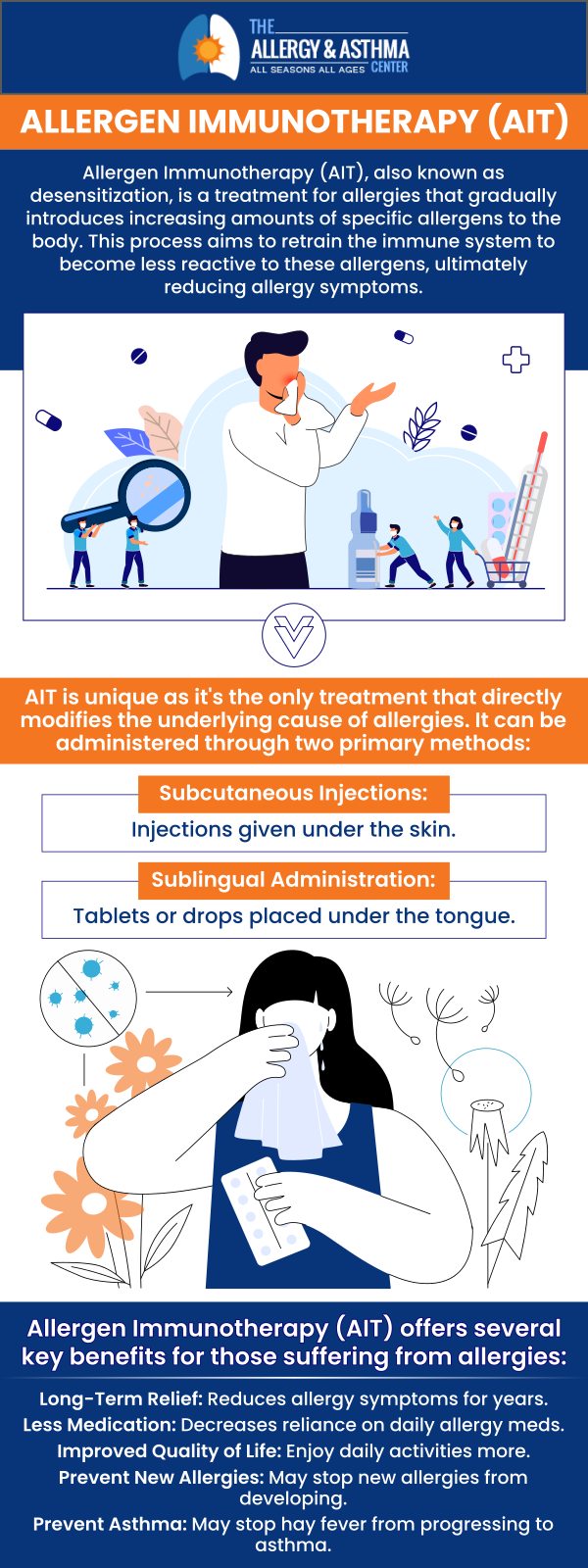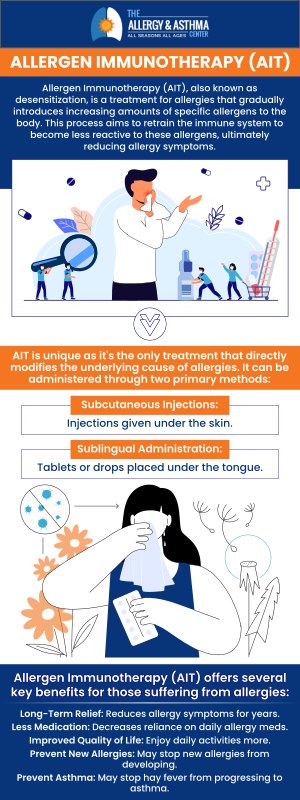Immunotherapy Questions and Answers
Immunotherapy or desensitization can play a very important role in your or your child’s comprehensive allergy program. Our allergy and asthma specialists will help determine the right treatment plan. For more information, please contact us or book an appointment online. We serve patients from Lawrenceville GA, Atlanta GA, Conyers GA, Suwanee GA, Duluth GA, Grayson GA, Decatur GA, Brookhaven GA, Lithonia GA and Covington GA.




Table of Contents:
Who needs immunotherapy?
How does immunotherapy work?
What types of immunotherapy are available?
What can I expect?
Are there any potential reactions to allergy shots?
Are there any times that one should postpone an allergy shot?
Can I give the injection to myself or to my child?
What happens if I miss a shot?
Do I really need to wait 20 the 30 minutes after an allergy shot?
Are there any medicines can interfere with allergy shots?
Does pregnancy prevent one from taking allergy shots?
After reading all of this you may have one more question: Is it all worth it?
Immunotherapy, also called desensitization or hypo-sensitization, is a form of treatment wherein extracts of allergens (pollens, dust, molds, etc.) are introduced into the body to induce an immunologic response, resulting in the eventual reduction or elimination of the allergic reaction.
Not all allergic patients need immunotherapy. The decision as to who would benefit from this treatment depends on the nature of the allergy, i.e., what the allergic patient is allergic to and the severity of the allergic symptoms. Also, immunotherapy is indicated for patients allergic to substances which they cannot avoid. The appropriateness of immunotherapy will be determined only after careful consideration of all of these factors.
It should be realized, however, that immunotherapy, although very effective, is never the sole modality in the treatment of the allergic individual. Immunotherapy is just one component of a comprehensive approach which may also include environmental control, and, when necessary, the use of medicines. A carefully balanced approach will offer the patient the best chance for a resolution of the allergic problem.
To understand how immunotherapy works, a brief explanation of the allergic response is necessary. In the simplest terms, an allergy is the immune system’s overreaction to things to which it ordinarily should not react, such as dust mites and pollen. Immunotherapy is intended to “reprogram” the immune system so that it no longer over responds when exposed to the offending allergen(s). This is accomplished by repeatedly exposing one’s immune system to the allergens over a long period of time. Like with any immunization, such as polio, tetanus, or pertussis, the actual administration of the substance causes the immune system to create antibodies against the substance administered.
Traditionally, the “gold standard” of immunotherapy has been in the form of injections of the allergen into the subcutaneous tissue of the upper arm, so called allergy shots. Allergy shots are presently the preferred form of immunotherapy by the vast majority of board certified allergists.
There has been increasing evidence in the medical literature suggesting that sublingual (under the tongue) immunotherapy may be equally as effective and safer than traditional allergy shots. Sublingual immunotherapy (SLIT) has been used in Europe for years and clinical trials are now underway in the U.S. to establish their efficacy and safety.
Immunotherapy is effective in reducing or eliminating allergic symptoms in the vast majority of patients appropriately placed on this therapy. In most patients, desensitization offers slow, steady, and significant improvements within six to 12 months after initiation of treatment. Some people report relief only after a few weeks to months, although this is unusual. If a patient fails to receive significant improvement within 18 months, then this treatment should be reassessed. Most patients complete the immunotherapy program in three to five years. Most have long-term improvement after desensitization is discontinued, lasting many years and sometimes lifelong.
Because allergy injections contain substances to which the patient is allergic, there is always a chance, although small, of an allergic reaction. The reactions to allergy shots can be divided into three categories:
Local reactions: It is not unusual for one to have a small local reaction at the site of the injection. This usually consists of minor swelling, redness, and itching. Reactions less than the size of a quarter are generally not significant, but should be mentioned to the allergy nurse prior to one’s next injection. Large local reactions may indicate that the allergy serum is too strong and adjustments of the dosage may need to be made at various times during the course of immunotherapy.
Systemic reactions: A systemic reaction is defined as one which occurs distant from the injection site and may involve multiple organ systems. They occur on rare occasions in highly sensitive individuals, or when individuals are receiving increased natural exposure to their allergens, such as occurs in pollen sensitive individuals during the spring and fall. These reactions may include generalized redness, itching, sneezing, runny nose, hives, coughing, wheezing and difficulty breathing. Even though very serious allergic reactions have been described in the medical literature, including a drop in blood pressure (shock) and even death, these are extremely rare.
Systemic reactions can almost always be averted by prompt recognition and treatment of symptoms. It is for these rare allergic reactions that all patients are required to wait in a physician’s office 20 to 30 minutes after an allergy injection.
Delayed reactions: Delayed reactions are usually local, but on rare occasions, can be systemic. They usually begin several hours after an allergy shot, but may be delayed as long as 24 hours. These symptoms are generally mild, but may include local itching, swelling and pain at the injection site, nasal symptoms, or wheezing.
For an individual who is experiencing an acute or ongoing allergic reaction, such as hay fever, asthma, or hives, then an additional injection of allergen may increase the risk of a reaction. If one is unsure as to whether the injection should be given, one should consult the injection nurse and a decision will be made as to whether the dose should be decreased, or whether the injection should be postponed.
An injection should not be given if the patient has had a significant fever within 24 hours. If asthmatic patients are experiencing any wheezing or respiratory distress, the injection should not be given. Injections should be postponed at least twenty-four hours after receiving a flu shot, tetanus shot, or any type of immunization. One should avoid vigorous exercise one hour prior to and one hour after an allergy shot.
The answer is a simple NO. Even though the chances of an allergic reaction are very low, it is essential that the injection be given in a physician’s office where an unexpected reaction could be quickly treated. Injections should be given only by those experienced in treating allergic emergencies. Patients should never give themselves an allergy injection!
For all practical purposes, nothing. One’s overall response to desensitization is dependent upon the cumulative dose of allergen received over a long period of time, not an individual dose. Therefore, if an occasional injection is missed, the overall program will not be affected. Everyone will miss an injection once in a while due to illness, vacations, or unforeseen events, and this is to be expected. On the other hand, one should be very diligent in receiving their injections on schedule as much as possible.
Yes! As mentioned previously, allergic reactions to the injections are very rare, but they do happen. Most of these reactions will become evident within 20 to 30 minutes. Therefore, if you cannot wait, then you should not have your injection.
Some medicines used to treat high blood pressure, heart rhythm disturbances, and headaches, can make the treatment of an allergic reaction more difficult. These medicines, called beta blockers, are widely used. Some commonly prescribed beta-blockers include:
– Acebutolol hydrochloride (Sectral).
– Atenolol (Tenormin).
– Betaxolol (Kerlone).
– Bisoprolol (Zebeta).
– Carteolol (Ocupress).
– Carvedilol (Coreg).
– Esmolol (Brevibloc).
– Labetalol (such as Normodyne or Trandate).
– Metoprolol (such as Lopressor or Toprol XL).
– Nadolol (Corgard).
– Penbutolol sulfate (Levatol).
– Pindolol (Visken).
– Propranolol (Inderal).
– Sotalol (Betapace AF).
– Timolol (Blocadren).
If you are taking one of these medicines, report this information to your allergist or the allergy nurse and hopefully an alternative medicine can be found so that the immunotherapy program can be continued.
Pregnancy is not a contraindication to allergy shots. However, initiation of desensitization is not recommended during pregnancy. For those who become pregnant after starting immunotherapy, studies indicate that allergy shots are safe to continue, but the dose should be held constant.
In the majority of cases, the answer is definitely yes. Allergy symptoms can vary from mild to severe and can cause chronic symptoms of the eyes, ears, nose, throat, lungs, and skin, leading to a compromised quality of life. In addition, allergies are of one of the leading causes of days missed from school and work, and overall loss of productivity. If it has been determined that desensitization can play a very important role in your or your child’s comprehensive allergy program, stick with it. You will likely be very pleased with the results.

Additional Allergy & Asthma Services
▸ Allergy Shots
▸ Allergy Testing
▸ Asthma
▸ Bronchodilators
▸ Drug Allergy
▸ Food Allergy
▸ Insect Allergy
▸ Nasal/Sinus Allergies
▸ Pediatric Allergy
▸ Pediatric Asthma
▸ Skin Allergy
▸ Spring Allergies




